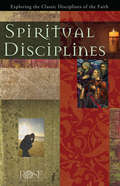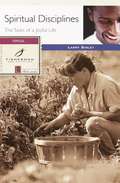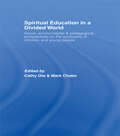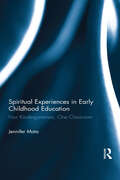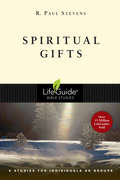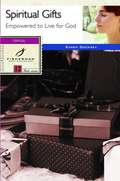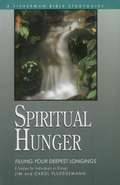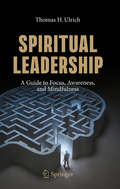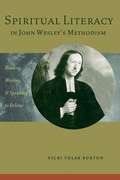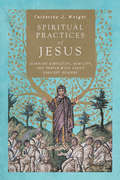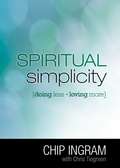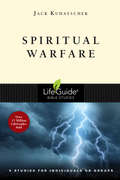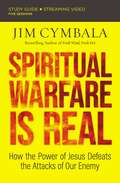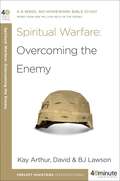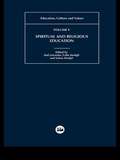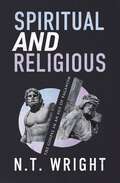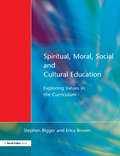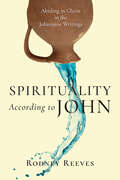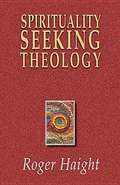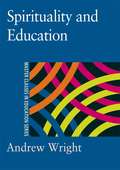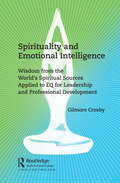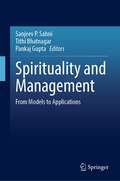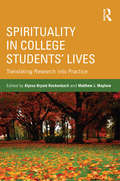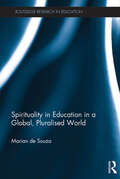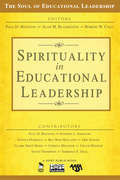- Table View
- List View
Spiritual Disciplines: Exploring the Classic Disciplines of the Faith
by Rose PublishingThe Spiritual Disciplines Pamphlet explains the classic spiritual disciplines that help us follow Jesus: Scripture reading, prayer, fasting, worship, solitude, and evangelism. The Spiritual Disciplines Pamphlet makes an excellent handout or Bible study on Christian maturity for a small group or Sunday school class. It addresses questions such as: What does it mean to be Jesus' disciples in the twenty-first century? Do spiritual disciplines look different in an electronic age? How can spiritual disciplines be a joy, not a legalistic burden?Includes an explaination and advice on these Spiritual Disciplines:* Bible Reading/Study* Prayer* Fasting* Worship* Service* Solitutude* Discernment* EvangelismEach Spiritual Discipline includes:* Examples from people in the Bible* Tips for getting started* How each discipline helps us to have a Christ-focused lifeDiscussion Questions* Scripture Reading: Read two of the Bible passages from the list on page 5. In your opinion, what is the message of these passages? Read the section on "The Disciplines Today." Some people love to read the Bible; others see it as a challenge. What ideas might work for those who struggle?* Prayer: Read one of the Psalms listed at the top of page 6 and pick one other Bible passage in that section. What is the writer of the Psalms expressing in his prayer? Is he being honest with God about his emotions and problems? In what way does this change your view of prayer? What attitude should we have? What kinds of prayers should we avoid? Pick one of the ideas in "The Disciplines Today" and share how you might apply it.* Fasting: Choose two of the passages at the top of page 8 to read. Why did these people choose to fast? Now look at the quote. How can we keep our focus on the right thing? Fasting is one of the most neglected of the Spiritual Disciplines, but it is excellent for teaching us self-control. Look at the tips. How might you practice the discipline of fasting? * Worship: People worship in many ways as we can see from the biblical examples at the top of page 9. Which of these suit your personality and circumstances the most? Look at the first point under "The Disciplines Today." In practical ways, how can we develop the right attitudes? When we worship in a group, the experience is often different from our private times of worship. What are the benefits of each? * Service: Jesus could have forced and bullied everyone into obeying him. Yet he did not. He chose to be a servant. Pick one of the passages from the Biblical Basis section at the top of page 10, and explain how Jesus' leadership is different from the kind of leadership found in the world today. Read the tips on page 10. How will you serve others in a way that imitates Jesus?* Solitude: Many biblical leaders sought to be alone with God. Pick one of the examples on page 11 and note anything of interest to you. If you are the type of person who likes having a lot of noise in your life, how do you practice solitude? What are the benefits of going off by yourself and praying and resting?* Discernment: Look at the examples of biblical discernment at the top of page 12. Read both of the last two bullet points in the Biblical Basis section. What does discernment mean and how does it look today? Some people seem to have the spiritual gift of discernment, but all believers can be more discerning in general. Why is it important to discuss issues with other believers?* Evangelism: Read all of the points at the top of page 13. What did Jesus teach? Look at the tips. What do you see as the most important? It is often easiest and most natural to share your own story with close friends. Do you ever sense an opportunity to discuss spiritual matters? Perfect for discipleship or small groups.
Spiritual Disciplines: The Tasks of a Joyful Life (Fisherman Bible Studyguide Series)
by Larry SibleyPractices such as prayer, worship, fasting, and solitude will take on new dimensions of richness as readers discover how these things can draw them into a deeper delight in God.From the Trade Paperback edition.
Spiritual Education in a Divided World: Social, Environmental and Pedagogical Perspectives on the Spirituality of Children and Young People (Spirituality in Education)
by Cathy Ota & Mark ChaterIn the era of globalization debate has turned to the vital need for a thorough understanding of its impact on the spirituality and health of the youth of today. Spiritual Education in a Divided World recognises the urgent need for effective research in this area. This exceptional volume takes an interdisciplinary approach to tackle the key question
Spiritual Experiences in Early Childhood Education: Four Kindergarteners, One Classroom
by Jennifer MataSpirituality is frequently avoided in the public school classroom in an attempt to prevent controversy. However, by ignoring, preventing, or discounting spirituality, educators can also inhibit children’s spiritual development. Based on qualitative research and interactions with both children and adults, Jennifer Mata argues that educators should be responsible for addressing children’s spirituality in the classroom and for re-introducing these topics into early childhood education. By surveying the existing literature on spirituality, Mata offers a working definition of spirituality as an essential characteristic of humanness, which helps connect individuals to themselves, others, and to the transcendent. The book portrays stories and descriptions of four kindergarten children in their classroom setting, exploring their different modes of expressing and experiencing spirituality. Finally, Spiritual Experiences in Early Childhood Education offers a review of pedagogical strategies to nurture spirituality, for both teachers to implement in the classroom and teacher educators to facilitate in teacher preparation programs.
Spiritual Gifts (LifeGuide Bible Studies)
by R. Paul StevensYou are unique. You have been created and invited by God to participate in his kingdom work. Yet, you have probably also experienced feelings of uncertainty about how to serve God, about what gifts you have to use, and about God's purpose for your life. In this eight-session LifeGuide Bible Study, R. Paul Stevens helps you to recognize your spiritual gifts and the gifts of others. And he leads you to consider how to practically use these gifts to glorify God in your relationships, your work and your world. This revised LifeGuide Bible Study features additional questions for starting group discussions and for meeting God in personal reflection, together with expanded leader's notes and a "Now or Later" section in each study. For over three decades LifeGuide Bible Studies have provided solid biblical content and raised thought-provoking questions—making for a one-of-a-kind Bible study experience for individuals and groups. This series has more than 130 titles on Old and New Testament books, character studies, and topical studies. PDF download with a single-user license; available from InterVarsity Press and other resellers.
Spiritual Gifts: Empowered to Live for God (Fisherman Bible Studyguide Series)
by Karen DockreyCelebrate Your Gift All Christians are gifted by the Holy Spirit, but many Christians don't know how to use their gifts. In this study you will explore what the gifts are, why they are given, and how you can begin putting your gifts to use for God's glory. Learn to celebrate and affirm the varied spiritual gifts God has given you. 8 studies for individual or groups
Spiritual Hunger: Filling Your Deepest Longings (Fisherman Bible Studyguide Series)
by Carol Plueddemann Jim PlueddemannA study of these passages on desiring God can help Christians discover anew that only the Bread of Life and the Living Water can satisfy their souls.
Spiritual Leadership: A Guide to Focus, Awareness, and Mindfulness
by Thomas H. UlrichSpiritual leadership focuses on what you can experience and how you can work on your 'self.' Taking a non-religious stance, this book introduces readers to a dynamic layer model of the self, with inner centricity at its core. Leaders will learn how to work at different levels of their personality in order to achieve this inner centricity – the inner-core balance, the foundation of effective leadership in the VUCA world, and the foundation of personal authenticity and natural authority. Spiritual leadership combines classic leadership theories and models of authentic leadership with philosophical concepts and consciousness and awareness techniques inspired by the contemplative mindfulness movement. Practical exercises and illustrative examples support the application of the concept in professional leadership and private everyday life.
Spiritual Literacy in John Wesley's Methodism: Reading, Writing, and Speaking to Believe (Studies in Rhetoric and Religion #6)
by Vicki BurtonVicki Tolar Burton argues that John Wesley wanted to make ordinary Methodist men and women readers, writers, and public speakers because he understood the powerful role of language for spiritual formation. His understanding came from his own family and education, from his personal spiritual practices and experiences, and from the evidence he saw in the lives of his followers. By examining the intersections of literacy, rhetoric, and spirituality as they occurred in early British Methodism-and by exploring the meaning of these practices for class and gender-the author provides a new understanding of the method of Methodism.
Spiritual Practices of Jesus: Learning Simplicity, Humility, and Prayer with Luke's Earliest Readers
by Catherine J. WrightLuke's Gospel was written to transform. In its original context, readers would have seen a portrait of Jesus as an ideal teacher and king, able to shape his people through exemplary leadership. They would have come to the Gospel expecting to be changed for God's purposes through the imitation of Jesus' lifestyle and adoption of his teaching. When today's readers approach the text in the same way, they can be transformed too. Spiritual Practices of Jesus explores Luke's portrait of the spirituality of Jesus, focusing on the themes of simplicity, humility, and prayer in his life and teaching. After establishing the likely thought patterns of Luke's first readers, Catherine Wright considers how Jesus models these three values and then explores how different readers have understood and employed key Lukan passages for spiritual formation, beginning with a first-century audience and tracing the reception of these texts in the ancient church. Demonstrating a theological interpretation of Jesus' spirituality grounded in church tradition, this accessible book combines New Testament studies and spiritual formation to provide fresh insight into the biblical text. Wright invites readers to join with Luke's earliest readers in adopting ancient spiritual practices that still hold the potential to revolutionize our relationships with money, ourselves, others, and God. Luke's Gospel reveals that as we individually and corporately imitate Jesus, we live lives of greater authenticity, are oriented toward his kingdom, and are transformed by his manner of life.
Spiritual Simplicity
by Chris Tiegreen Chip IngramChanging "Love" from a Noun to a Verb In our frantically driven, complex lifestyle, we suffer from fatigue, little margin, shallow relationships, and fractured families. As a result of this driven lifestyle, our souls are dis-eased--they have a lack of ease. This highly practical, comforting book maintains that it is possible to run the race at a different, more meaningful speed. Not only is it possible; it's absolutely necessary. The key to simplifying life, Chip Ingram says, is to make sure love is your #1 priority. Love redirects our focus and unravels the complex, overextended lifestyle that keeps us ever running but never arriving. In Spiritual Simplicity, Ingram explains how to change our love from a noun to a verb and choose to concentrate on what really matters: the people we love the most. Each chapter ends with probing questions to help you process, ponder, and discuss the life-giving principles laid out in this desperately needed book. *** If you crave simplicity, yearn for peace and calm, this book is for you. Through biblical teaching and practical insights, author Chip Ingram goes beyond so-called quick fixes and speaks to men and women who know what they need to do, want desperately to do it, but find it next to impossible to break free of the too many good and important things that flood their lives. The thesis of this book is very simple: Spiritual simplicity will never be achieved by strategic, managerial attempts to control our lives and schedules but through doing less because we love more. As you learn the practice of loving people, you will experience a shift from complex to simple, from hurried to peaceful, from "never enough time" to "time enough for those you love." Lasting change is within your reach.
Spiritual Warfare Is Real Bible Study Guide plus Streaming Video: How the Power of Jesus Defeats the Attacks of Our Enemy
by Jim CymbalaSatan is not out to get you to follow him; he's out to get you to ignore him. When we spiritually zone out, doze off, fall asleep, we are forgetting that we are in the middle of a war--and Satan loves it this way! He loves to convince people he doesn't exist. But Satan is real. He is an actual enemy of our soul. He is waging a real war against us. And we need to wake up and get in the fight. If we fail to do this, we do so at our own peril.In this five-session video Bible study (streaming included), bestselling author Jim Cymbala shows participants how to:Recognize the spiritual wars around them.Understand the enemy's plots against them.Develop practical strategies for fighting back.As believers in Christ, we have been given everything we need to stand strong and take the fight to the enemy. As we do, we will recognize, as the apostle Paul writes in 1 Corinthians, that God "gives us the victory through our Lord Jesus Christ" (1 Corinthians 15:57).Sessions and video run times:Know Your Enemy (17:56)Overcoming the Attack on Your Faith (16:40)Resisting the Attack on Love (18:27)Pressing Through the Attack on Your Calling (19:18)Fighting Through the Attack on Prayer (20:09)This study guide has everything you need for a full Bible study experience, including:The study guide itself--with discussion and reflection questions, video notes, and a leader's guide.An individual access code to stream all five video sessions online (you don't need to buy a DVD!).Streaming video access code included. Access code subject to expiration after 12/31/2027. Code may be redeemed only by the recipient of this package. Code may not be transferred or sold separately from this package. Internet connection required. Void where prohibited, taxed, or restricted by law. Additional offer details inside.
Spiritual Warfare: A Six-Week, No-Homework Bible Study--More Than 900,000 Sold in the Series (40-Minute Bible Studies)
by Kay Arthur David Lawson B. J. LawsonAre you ready for battle? Whether you realize it or not, you live in the midst of spiritual combat. Your enemy, the devil, is dangerous, destructive, and determined to keep you from effectively serving God. In order to defend yourself against his attacks, you need to know how the enemy operates. Through this six-week study you will gain a thorough knowledge of the enemy's tactics and schemes. As you discover the truth about Satan--including the limits of his power--you will be equipped to stand firm against his attacks and to develop a strategy for living daily in victory.
Spiritual and Religious Education (Values, Culture And Education Ser. #Vol. 5)
by Mal Leicester Sohan Modgil Celia ModgilVolume V distinguishes religious and spiritual education and takes a multi-faith approach to pedagogic, curricular and resource issues. The important area of collective worship is also addressed.
Spiritual and Religious: The Gospel in an Age of Paganism
by N. T. Wright"I'm spiritual but not religious." It's a phrase that's often used to explain why people still feel that life must have some kind of transcendent meaning, even if they don't go to church.But what does this "spirituality" consist of? In Spiritual and Religious N. T. Wright argues that, whether people realize it or not, they are often simply reverting to forms of ancient paganism that are very similar to those that confronted the earliest Christians.With his characteristic verve and incisiveness, Wright traces the parallels between the worldviews of the first and twenty-first centuries, and shows how a better understanding of God as Trinity can breathe fresh life into our understanding and preaching of the gospel today.He concludes this prophetic book with a call to contemporary Christians to make a clear choice:"Are we to compromise with paganism, to assimilate, to water down the distinctives of Christian faith in order to make it more palatable? Are we to retreat into dualism, into a private 'spiritual' religion which will assure us of an other-worldly salvation but which will leave the powers of the present world unchallenged. . . ? Or are we to worship the God who is Father, Son and Spirit, and to find in that worship a renewed courage, a renewed sense of direction, and a renewed hope for the future?"
Spiritual, Moral, Social, & Cultural Education: Exploring Values in the Curriculum
by Stephen BiggerFirst Published in 1999. Routledge is an imprint of Taylor & Francis, an informa company.
Spirituality According to John: Abiding in Christ in the Johannine Writings
by Rodney ReevesThrough all of John's works, a consistent message is woven: being a Christian is about abiding in Christ and in his words. The Gospel of John, the epistle of 1 John, and the Apocalypse all begin in the same way: by pointing to the importance of knowing the Word, both written and incarnate. Using an artistic, storytelling approach to spirituality, John relies heavily on readers' imaginations to help them see what it takes to become disciples by abiding in Jesus. Rodney Reeves combines exegesis with spiritual reflection to explore how the only biblical writer to employ three different genres presents a consistent vision of Christian spirituality. Rather than focusing on detailed instructions, John uses evocative metaphors and illustrations so that readers can envision how to follow Jesus—as disciples, in community, and even at the end of the world. Filled with stories and implications for today's readers, Spirituality According to John provides an accessible introduction to the rich spiritual world of the Johannine literature that makes up much of the New Testament. In John's era and now, anyone who has ears to hear can learn to truly abide in Christ.
Spirituality Searching for Theology
by Roger HaightMany religious seekers in our time do not understand church doctrines or fail to see the bearing of such doctrines on their immediate lives. For such people, Christian spirituality can offer a more pertinent and fulfilling avenue toward faith. In treating the Christian story of creation, the life of Jesus, the history of the church, eschatology and more, Roger Haight suggests ways in which spirituality-the cultivation of a relationship with the transcendent-can lead spiritual seekers to open-ended questions of theology. Book jacket.
Spirituality and Education: Knowledge, Reality And Religious Literacy (Master Classes In Education Ser.)
by Andrew WrightSpirituality and Education introduces the basic contours of current debate in a form accessible to both classroom teachers across the curriculum range, and to school managers. It covers all key areas, including:* problems of defining spirituality* government legislation and supporting documentation * relevant empirical research* the social dimension of spirituality* secular and religious manifestations of spirituality in contemporary society* theories of childhood spiritual development* contemporary approaches to spiritual education, including collective worship and cross-curricular teaching. A variety of different perspectives and approaches will be offered, and readers are encouraged to be reflective through a number of tasks which relate all issues raised directly back to their own specific circumstances. The author includes questions, quotes and lists of further reading.
Spirituality and Emotional Intelligence: Wisdom from the World’s Spiritual Sources Applied to EQ for Leadership and Professional Development
by Gilmore CrosbyThis book weaves together spirituality and a systemic version of emotional intelligence that incorporates Kurt Lewin’s social science and other sources. Emotional intelligence calls on us to be fully present “to the moment.” It calls on us to be appreciative of ourselves and our relationships. Likewise, a calm and compassionate presence is almost universally recognized as a spiritual way of being. In other words, the overwhelming majority of the world’s spiritual sources call on us to be emotionally intelligent and that link is explored with unique clarity in this simple yet powerful text. We are all reactive at times. Becoming more objective and less attached allows us to feel our feelings without being a prisoner to acting on them in habitual ways. From a more detached perspective, feelings are neither good nor bad, but simply clues as to how we are perceiving our environment, especially our social environment. This is especially important in terms of our relationships at work. Our perceptions about what people intend trigger our emotional reactions. Think about the difference when you perceive critical feedback as a sincere attempt to help or when you perceive it as an attack of some sort. Perception evokes different emotional responses. Objectivity about our own perception is even more important than objectivity about emotion, because the former usually precedes the later. Paradoxically, being detached allows one to appreciate and experience one’s emotions more fully. Recognizing emotion as part of your inner guidance system instead of as something dangerous that must be controlled or denied is freeing. The less emotion runs you, the more you can accept feeling what you feel. Emotion is a form of physical energy. Fighting your own feelings takes energy. Allowing the ebb and flow of emotion is essential to physical and emotional health and to accepting ourselves as we are.
Spirituality and Management: From Models to Applications
by Pankaj Gupta Sanjeev P. Sahni Tithi BhatnagarThis book discusses the importance of integrating spirituality from diverse knowledge backgrounds to be effective in its everyday use. Bringing together global experts in the field, this book provides an extensive overview of the various spirituality and management themes, models, approaches, and complexities. The chapters in the book include deliberations upon wisdom from the Bhagwat Gita; Buddha; the impact of spirituality on good governance, quality of life; integrating ethics, human values, happiness; meditation; and linking of spirituality and management and their effect on leadership, and workplace environment. A thought-provoking read for scholars, students, and policy-makers, this book provides an Indian perspective on managing spirituality at work. This book is even more relevant in the post-COVID-19 scenario as it focuses on the holistic development of people and organizations.
Spirituality in College Students' Lives: Translating Research into Practice
by Matthew J. Mayhew Alyssa Bryant RockenbachSpirituality in College Students’ Lives draws on data from a large-scale national survey examining the spiritual development of undergraduates and how colleges and universities can be more effective in facilitating students’ spiritual growth. In this book, contributors from the fields of education, psychology, sociology, social work, and religion present research-based studies that explore the importance of students’ spirituality and the impact of the college experience on their spiritual development. Offering a wide range of theoretical perspectives and worldviews, this volume also includes reflections from distinguished researchers and practitioners which highlight implications for practice. This original edited collection explores: Emerging theoretical frames and analytical approaches; differences in spiritual expressions and experiences among sub-populations; the impact of campus contexts; and how college experiences shape spiritual outcomes. Spirituality in College Students’ Lives is an important resource for higher education and student affairs faculty, administrators, and practitioners interested in nurturing the inner lives of college students.
Spirituality in Education in a Global, Pluralised World (Routledge Research in Education)
by Marian de SouzaA particular problem associated with international research in the field of spirituality and education is the reluctance of scholars to agree on what spirituality means, with numerous descriptions increasing ambiguity and reducing the impact of research in the discipline. This book argues that it is important to understand spirituality as a unifying concept that has the potential to be meaningful in its application to the lives of children and young people in areas of learning and wellbeing. Chapters show why and how spiritual learning should be addressed across the curriculum, with implications for the design of learning programs and environments.
Spirituality in Educational Leadership
by Alan M. Blankstein Paul D. Houston Robert W. ColeWith contributions from top leadership figures, this innovative and inspirational collection combines research and thought-provoking ideas for applying spiritual principles to administrative roles and responsibilities.
